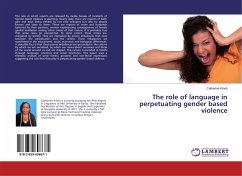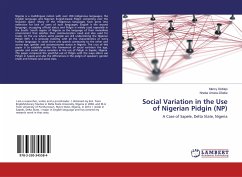
The role of language in perpetuating gender based violence
Versandkostenfrei!
Versandfertig in 6-10 Tagen
36,99 €
inkl. MwSt.

PAYBACK Punkte
18 °P sammeln!
The rate at which reports are released by media houses of incidents of Gender Based Violence is alarming. Nearly daily, there are reports of both girls and boys being defiled by not only strangers but also by people known and close to them. There are reports of wives and husbands battered by their partners, women experiencing consequences of female genital mutilation among other crimes of that nature; it is probably true that some cases go unreported. To some extent, these crimes are instigated by society. They are motivated by power imbalances that exist between the perpetrators and the victi...
The rate at which reports are released by media houses of incidents of Gender Based Violence is alarming. Nearly daily, there are reports of both girls and boys being defiled by not only strangers but also by people known and close to them. There are reports of wives and husbands battered by their partners, women experiencing consequences of female genital mutilation among other crimes of that nature; it is probably true that some cases go unreported. To some extent, these crimes are instigated by society. They are motivated by power imbalances that exist between the perpetrators and the victims. These imbalances are manifested in the educational, social, economic and biological differences. A plausible fact is that these power imbalances are grounded in the culture by which we are socialized, by which our views about ourselves and these of the world around us and are shaped. This culture is encoded in beliefs through language, practices and social structures. This paper uses a thematic analysis of some Kimeru proverbs and non-literal expressions suggesting the role that they play in perpetuating gender based violence.












